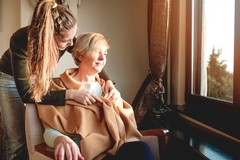
Becoming a caregiver for a loved one with dementia is very demanding. Many family members in a caregiving role might not know the proper steps to take as their loved one’s dementia continues to progress.
It isn’t uncommon for family caregivers to sacrifice their own lives and well-being for their loved one with dementia. Copperleaf Senior Living wants to help ensure you know what to expect as a family caregiver for someone with dementia.
What to expect as a caregiver?
When taking on the large role as a caregiver for someone with dementia, it is common to experience increased stress with potential burnout. Experiences may differ, but it is likely that family caregivers may experience the following:
- Change in sleep schedule or sleep disturbances
- Physical, mental or psychological health changes
- Social isolation or routine change
- Financial strain
The mindset and resources the family caregiver has is also an important element. Family members who become caregivers because of guilt or sense of duty are more likely to deal with negative effects on mental and emotional health.
What to watch for in a loved one
Dementia is an extremely difficult disease to watch your love one suffer through. They slowly begin to lose mental, physical and emotional capacities. Things to watch for as a family caregiver include:
- Agitation or aggression. This can include both physical and verbal agitation. It can be hard for patients with dementia to fully communicate and express what they want or need from their caregivers which can then lead to frustration.
- Paranoia. Delusion and paranoia occur due to declining cognitive function. Due to this, they are unable to perceive or process the world around them in a clear way. Patients in mid-to-late stages of dementia might experience delusion.
- Wandering. This can be caused by delusion and memory loss. Love ones may become unfamiliar with their surroundings, even in a very familiar setting, such as their own home or neighborhood. This can lead to increased wandering and confusion with direction.
- Repetition. This can be repetition of words, phrases or actions. Dementia can hinder your loved one’s ability to properly communicate, causing repetitive behaviors to become common.
- Skipping common chores. This could be forgetting/refusing to bathe or practice proper hygiene regimens. It could also be forgetting/skipping meals and even skipping medicine routines. This could result in major concern for health problems if these actions persist.
- Incontinence. This might mean forgetting where the restroom is or not realizing or recognizing the sensations of needing to use the restroom. It can be difficult for the patient to perform the physicality’s of using the restroom such as walking.
Dealing with caregiver stresses
Knowing warning signs and things to watch for with your loved one as you step into the role of family caregiver is important. Here are some ways to handle common caregiver stresses before they become an issue or take a toll:
- Research. Understanding this disease and how it affects those who suffer from it is a good first step to prepare yourself in taking on this role.
- Ask for help. Know that you are not alone in this and there are many resources to help you when you need it. Caregiving is physically and emotionally tiring and support of family, friends, and the community can help immensely. Considering short term respite stay in memory care can also be beneficial for caregivers experiencing burnout.
- Plan ahead and be realistic. Plan how this new role as caregiver might affect your life and the life of your loved one. Know there may be good and bad days, but ensuring your loved one is in a safe, comfortable, and comforting environment is key.